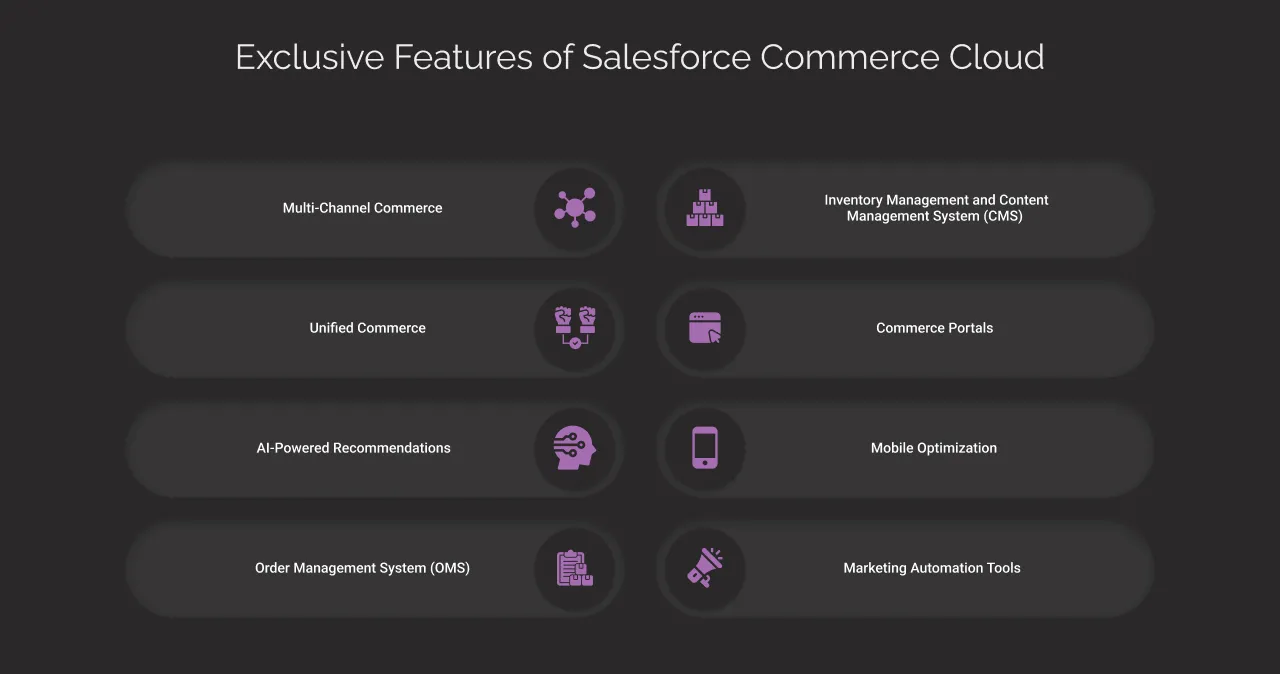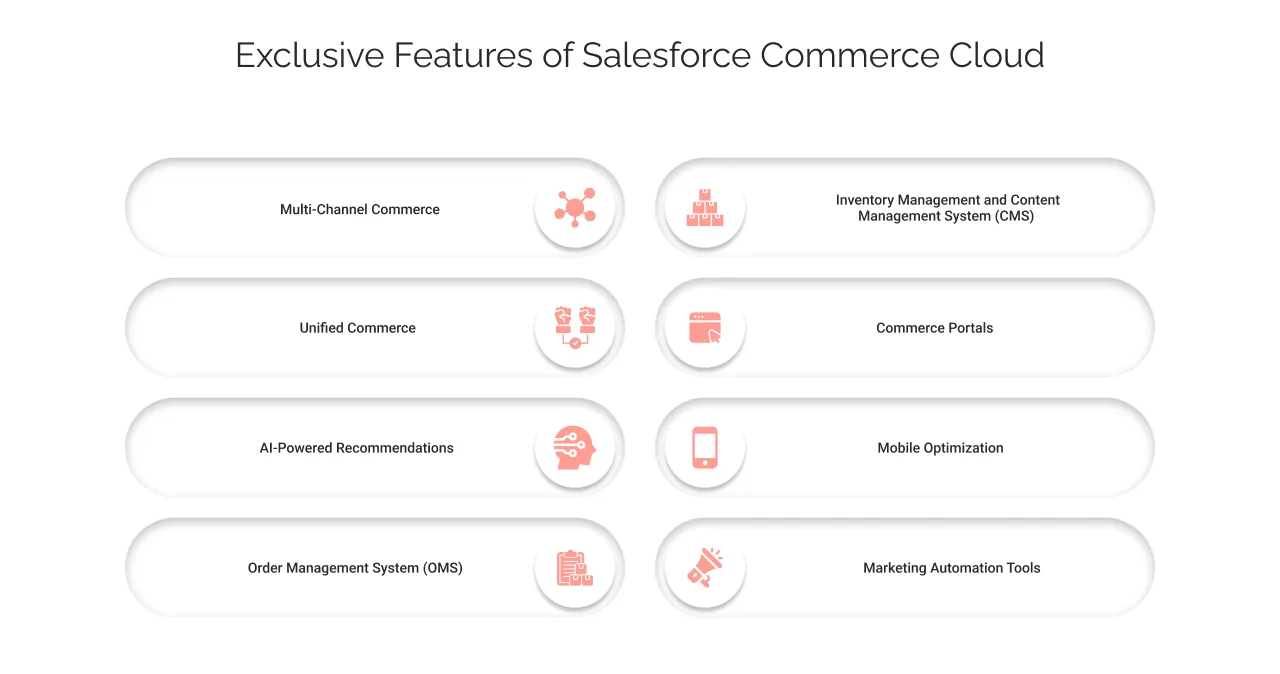Salesforce Commerce Cloud Explained: Everything You Need to Know
Table of Contents
Are you tired of limiting your customer reach to just your local area? While with an online presence, the world is your oyster, and there’s no better way to tap into the eCommerce market than moving ahead with Salesforce Commerce Cloud.
While many might be skeptical about the transition to an e-commerce platform, considering it a daunting task, you can be rest assured that this is going to be the future of the commerce landscape. Also, the global e-commerce retail market is expanding at an alarming rate and is expected to reach $6.8 trillion by 2028. So, if you want your business to thrive, you must get on board before it’s too late.
Is the transition going to be that difficult? Not at all, thanks to this transformative digital commerce solution offered by Salesforce. So, let’s bury all your doubts in a hatchet and walk through how Salesforce Commerce Cloud can make your business thrive and stand out.
What is Salesforce Commerce Cloud?


Salesforce Commerce Cloud is a multi-tenant cloud platform that integrates your businesses with customers over multiple platforms and devices. It is designed to help businesses create and manage their online shopping experiences. Along with that, the platform integrates seamlessly with other Salesforce products, which helps businesses manage customer relationships, marketing, and sales in one unified system.
The platform has everything you need to take your online business to the next level. From marketing and sales to content management, automation, reporting, and even predictive intelligence, every tool is present for your ease. All this is just the beginning. It also equips businesses with a range of high-functionality tools to plan, develop, launch, and promote their online presence.
Let us now look at the platform’s evolution over the years for a much broader perspective.
Evolution of Salesforce Commerce Cloud


The evolution of Salesforce Commerce Cloud (SFCC) is a compelling journey that showcases its transformation from a niche player to a leading force in the e-commerce landscape. Founded in 2004 as Demandware, the platform quickly garnered acclaim for its robust B2C capabilities, enabling retailers to create and manage online stores effectively.
Following this acquisition, Demandware was rebranded as Salesforce Commerce Cloud, seamlessly integrating with Salesforce’s extensive CRM solutions. The evolution continued with the 2018 acquisition of CloudCraze, which enriched SFCC’s offerings for B2B commerce and allowed for sophisticated pricing and account management features.
By 2021, SFCC introduced a unified commerce solution that combined B2B and B2C functionalities, now known as D2C commerce cloud, catering to businesses engaging in both markets. Later, the platform’s commitment to innovation is further exemplified by its incorporation of AI for personalized shopping experiences and its support for Headless Commerce architecture, providing unparalleled flexibility for modern e-commerce needs.
Who Uses Commerce Cloud?
There’s quite a bit of buzz that the platform isn’t suitable for businesses of all kinds. But this is just a myth. SFCC is a versatile platform that can be suited for all from small start-ups to large enterprises. So, whether you’re a business that sells to other businesses in bulk a new brand that wants to directly sell and increase its online presence, or even a customer goods company the platform has got you covered.
Exclusive Features of Salesforce Commerce Cloud


Below are some of the exclusive features offered by the platform:
Multi-Channel Commerce
The cloud enables businesses to sell across diverse channels including web, mobile, social media, and physical stores (brick-and-mortar stores). This ensures a consistent and cohesive shopping experience for customers, regardless of the platform they choose for shopping.
Unified Commerce
The platform offers a single interface for managing both B2B and B2C operations for enhancing convenience. This sync allows businesses to streamline their sales strategies and maintain a consistent brand presence across all channels.
AI-Powered Recommendations
By leveraging Salesforce’s Einstein AI, the users can leverage predictive analytics that helps them identify customer trends, allowing them to optimize product offerings and marketing strategies effectively. And to make things more convenient and smart Salesforce has recently launched Agentforce which has a suite of its autonomous AI agents. The AI agents will transform Salesforce Commerce Cloud into a more intelligent and responsive platform.
Order Management System (OMS)
Efficient order management is essential for any business, and Salesforce Commerce Cloud offers a reliable solution via the Order Management feature. This feature encompasses a range of processes and tools designed to ensure the timely delivery of products or services. This includes order creation, processing, tracking, fulfillment, and refund/return management. SFCC also provides convenient tools and integrations for payment gateways, inventory management, and shipping carriers. Also, you can automate return labels to streamline the entire order management process.
Inventory Management and Content Management System (CMS)
SFCC equips businesses with tools to monitor inventory levels across multiple locations in real-time, helping to prevent stockouts and overstock situations, thus optimizing inventory management. It also provides a robust CMS that allows businesses to manage product information, images, pricing, and promotions with ease, eliminating the need for extensive technical knowledge.
Commerce Portals
Commerce portals are online platforms that enable businesses to manage various aspects of their e-commerce operations, such as product catalogs, pricing, promotions, order management, payment processing, and customer service. These portals are typically part of cloud-based e-commerce platforms known as commerce clouds, which provide businesses with a comprehensive set of tools and services to create and manage their online stores.
Mobile Optimization
As per a Salesforce Commerce Solution Guide, almost 55% of all orders are placed
from mobile devices. Thus the platform includes features for creating mobile-optimized websites and applications, ensuring an enjoyable and seamless shopping experience for mobile users, which is crucial in today’s mobile-first world.
Marketing Automation Tools
In addition to other features, the platform provides integrated marketing tools that enable businesses to create targeted email campaigns, promotions, and dynamic pricing strategies, which enhance customer attraction and retention.
Storefront Reference Architecture (SFRA)
Lastly, the one standout feature is the Storefront Reference Architecture (SFRA). It is a powerful B2C framework designed for building high-quality and responsive eCommerce storefronts. With its extensive collection of customizable components, developers can create engaging online shopping experiences that are optimized for all devices. By leveraging the capabilities of SFRA, businesses can effortlessly expand their eCommerce operations and ensure a seamless omnichannel experience for their customers. However, implementing it effectively requires in-depth platform expertise, making it crucial to hire Salesforce Commerce Cloud developers who can apply best practices and tailor solutions to your business goals.
Moving ahead, let us talk about some of the key benefits of using the platform.
Salesforce Commerce Cloud Benefits: Explained


This cloud is a game-changer for your eCommerce business. Here’s how it benefits you.
Tailored Experiences
Utilizing advanced algorithms, the platform pointers analyze customer behavior and preferences to deliver personalized product recommendations, content, and marketing campaigns. This targeted approach enhances customer engagement and fosters loyalty.
Unified Shopping Experience
SFCC consolidates various e-commerce functions, such as inventory management, order processing, and customer data, into a single interface. This centralized approach simplifies operations for businesses and enhances the overall shopping experience for customers.
Scalability
Designed to grow with your business, SFCC can handle increased traffic and transaction volumes without compromising performance, making it a sustainable choice for long-term growth.


The Future of E-Commerce is Here. Are you ready?
Without a doubt, SFCC can significantly impact your e-commerce business. By utilizing the capabilities of this platform, you can deliver an exceptional customer experience, stand out from your competition, and drive growth for your business!
So don’t let the initial challenges of implementing Salesforce Commerce Cloud hold you back from unlocking its full potential. Get the right resources and support from renowned Salesforce Development Partners like Cyntexa, who can confidently navigate the process and achieve your business goals.
Don’t Worry, We Got You Covered!
Get The Expert curated eGuide straight to your inbox and get going with the Salesforce Excellence.
AUTHOR
Priyanshu
Salesforce Commerce Cloud Expert
Priyanshu, a Commerce Cloud expert, has 6+ years of experience and 8+ certifications. He specializes in crafting seamless, scalable e-commerce solutions that enhance customer experiences, maximize conversions in the digital marketplace. His expertise ensures businesses stay agile, competitive, and customer-centric.


Cyntexa.
Join Our Newsletter. Get Your Daily Dose Of Search Know-How









